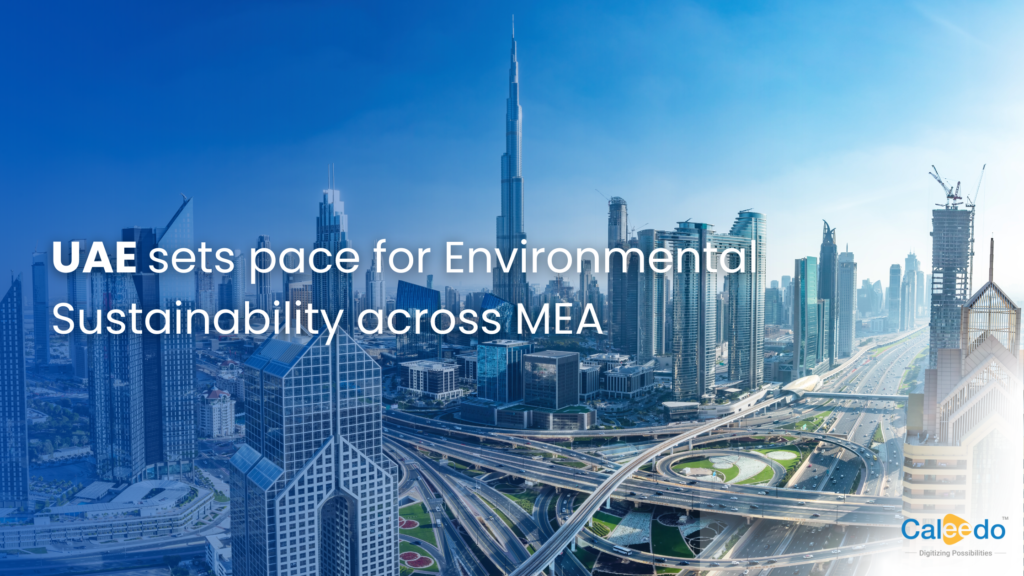UAE sets pace for Environmental Sustainability across MEA

Original Article – https://www.sustainabilitymenews.com/environmental-social/uae-sets-pace-for-environmental-sustainability-across-mea
Original Article – https://www.sustainabilitymenews.com/environmental-social/uae-sets-pace-for-environmental-sustainability-across-mea
The United Arab Emirates remains the leader, by most key measures, in environmental sustainability and climate action across the Gulf and Africa, says a new Agility Global report that tracks government and business policies, practices and investment related to the environment.
The findings, are contained in a report that updates Agility’s Middle East and Africa Environmental Sustainability Scorecard, issued last November.
The Scorecard examined the performance of 17 MEA countries in environmental sustainability outcomes, government policies and corporate practices. South Africa and the UAE led as the top performing countries in their respective regions and overall.
The new stand-alone report focuses on the UAE and says that the Emirates outscores all five other GCC countries in key areas of environmental progress and sustainability.
It concludes that the UAE:
1. Possesses a “strong base” in green investment, innovation and technology by the government, but that businesses in the UAE stand to improve private sector innovation and investment
2. Scores well in infrastructure and transport because of its investment in mass transit, electric vehicle charging and cleaner port infrastructure
3. Beefed up climate financing regulations and net-zero reporting and monitoring
4. Boosted nuclear and solar capacity
5. Focuses on air quality, water scarcity and mangrove conservation to protect its natural environment
6. Performs well in waste management, innovating to promote circularity and banning single-use plastics in 2024
“The UAE shows strong collaboration between the government and private sectors in implementing its environmental sustainability agenda,” the report says.
“While further progress is needed in areas such as green finance, lowering barriers to entry in the energy market, and filling remaining regulatory gaps, the country is well positioned to enhance its regional leadership role.”
The report noted the country’s leadership in green hydrogen pilot projects, and highlighted its sustainability startup accelerator, Catalyst.
It also cites UAE government estimates that the green energy transition could attract AED 600 billion in fresh investment in renewables and clean energy while boosting exports by AED 25 billion and generating 160,000 new jobs in the Emirates.
Agility Global Chairman Tarek Sultan said: “The UAE is becoming a global leader in sustainability by demonstrating the seriousness of its commitment to clean energy, green infrastructure and climate financing assistance for developing countries.
“Its US$54 billion pledge towards investing in renewables by 2030 and $30B commitment to assisting developing countries in making the clean energy transition are notable. We believe that the scope and scale of the Emirates’ sustainability agenda will generate green-growth opportunities for future-minded investors and businesses.”
The UAE report builds on the results of the 17-country Scorecard, which described MEA nations as “relative late comers to global sustainable development” but said they “are rapidly stepping-up their sustainability strategies, programs and investments.”
The Scorecard used 48 performance and progress indicators to assess performance and compare countries.
The indicators include data, regulatory frameworks, policy assessments, incentives and corporate practices across six pillar areas: green investment and technology; sustainable infrastructure and transport; governance and reporting; energy transition; environmental ecosystems; and circularity.
Last fall, roughly two-thirds of UAE business people surveyed for the Scorecard said climate change affects their business operations; and half said their companies would allocate 5% to 20% of capital expenditure toward achieving environmental sustainability targets.
The UAE report was commissioned by Agility Global, a multi-business owner and operator and investor, listed on the Abu Dhabi Securities Exchange (ADX).
It was compiled by Horizon Group, a Geneva-based firm that specializes in research and analysis for international organizations, governments and leading businesses.
At COP28, Agility joined 13 other businesses to form the World Economic Forum’s Leaders for a Sustainable MENA, pledging to address climate change in a region where only 12% of MENA businesses have set a net-zero target.
Two of Agility Global’s three largest operating businesses (Menzies and Tristar) have committed to net zero. Together, Menzies and Tristar accounted for more than 74% of FY 2023 revenues.
Agility Global’s third-largest business, Agility Logistics Parks, developed the first ever EDGE ADVANCED certified “zero-carbon ready” warehouses in the GCC (in Saudi Arabia) and West Africa (in Côte D’Ivoire).



